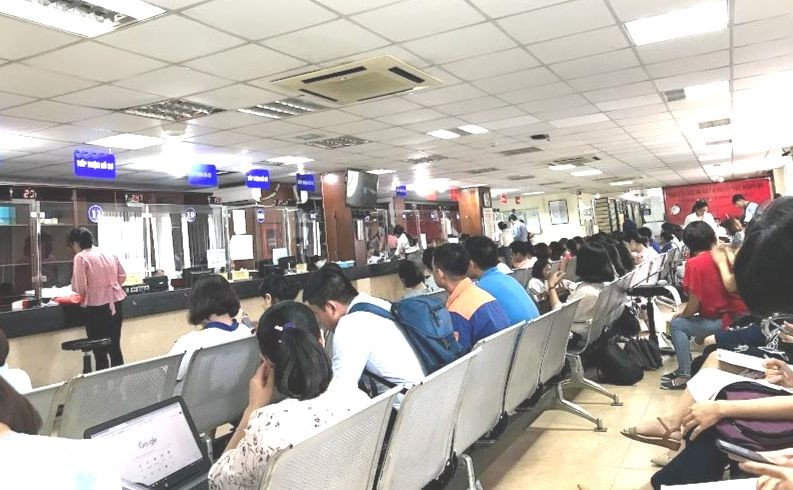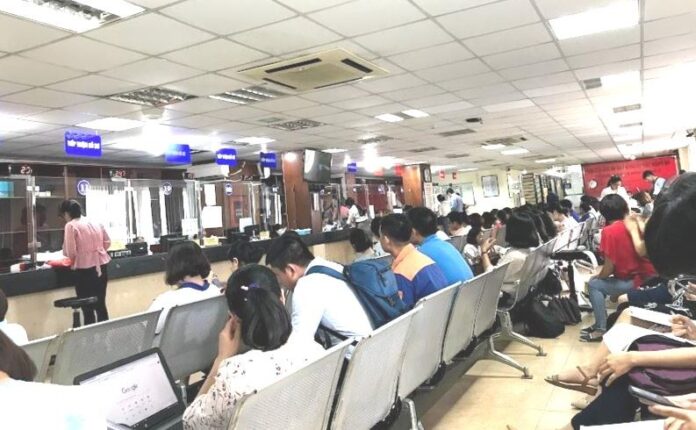Frustration with Bureaucratic Red Tape
For many entrepreneurs, the journey of building a business doesn’t start with products, markets, or business strategies but with the tedious task of navigating through administrative procedures and red tape.
Holding a stack of documents at the Hanoi Business Registration Office, Mr. Nguyen Van Tien from Thanh Xuan, Hanoi, shared his experience: “It took me almost three weeks just to complete the procedure for household business registration. Each time I submitted the documents, I was asked to make adjustments here and there. Meanwhile, the online portal states that the process should only take three working days.”
Mr. Tien’s documents were returned three times due to a mistake in the ward name in the business address. Instead of providing support to correct the error, the receiving officer simply said, “Go back and redo it.” “We don’t mind following the procedure, but if the officer picks on every comma and full stop without giving specific instructions, small businesses like us are left to figure things out on our own, making mistakes, correcting them, and resubmitting, which prolongs the process unnecessarily,” Mr. Tien shared.

The Business Registration Offices in localities are always bustling with people doing procedures online and offline.
The issue lies not in the number of procedures but in the overlap, lack of interconnectivity, and transparency between agencies. Especially, despite the government’s strategy for national digital transformation and the launch of numerous online public service portals, the reality shows that many of these systems are overloaded and unstable, causing businesses to lose significant time in completing procedures.
Sharing her experience with Tien Phong , Ms. Tran Thi Hanh, director of a medical equipment company, said that recently, her company was undergoing a procedure to change the legal representative, but when submitting the documents to the National Portal on Business Registration, the system kept showing errors. After waiting for several days without success, Ms. Hanh contacted the hotline on the website for support but couldn’t reach anyone.
A survey by the Vietnam Chamber of Commerce and Industry (VCCI) in 2024 showed that over 58% of small and medium-sized enterprises find it difficult to complete administrative procedures online due to unstable systems, interface errors, or lack of technical support staff.
“This happens quite often, and each time, businesses have to wait for several days. Our company has to assign a department to work overtime to submit documents because the system is overloaded during office hours,” Ms. Hanh said. She added that on one occasion, due to an urgent need to change some information, they had to go to the one-door transaction office to submit the documents directly. Even though the appointment slip clearly stated that it would take three days, the company still had not received the documents after three days.
“Ironically, we had committed to our foreign partners that we would complete the task within this period to sign the contract. However, as the procedure was not finished, we couldn’t explain to them that it was due to technical issues from the authorities, which damaged our reputation,” Ms. Hanh shared.
The Rise of ‘Fixers’
Due to the difficulties in completing these crucial procedures, many businesses and individuals have turned to “fixer” services to save time. A survey by Tien Phong found that many law firms and agencies now specialize in providing these services.

The struggle with crucial business procedures has led to the proliferation of support services.
From registering a new business certificate to increasing or decreasing charter capital, adding business lines, changing shareholders or company addresses, services, or industries, or even dissolving a company, the cost ranges from VND 1-3 million per item. Obtaining an investment registration certificate for a company can cost up to VND 30-40 million, with a completion time of 20-35 days depending on the province or city.
Ms. Nguyen Thi Huyen, a startup founder in the education sector in Hanoi, shared that it took her over 20 days and the help of a “full package” service with a fee of several million VND to obtain the enterprise registration certificate.
A representative of a law firm revealed that with the increasing number of businesses, the National Portal on Business Registration and local portals are now overloaded. Moreover, there is a shortage of personnel to handle the workload.
“The three-day completion time is only theoretical and counts from the date of submitting a fully complete and correct set of documents. In reality, it can take up to a month due to mistakes made by the applicants. Even for professional units like us, it takes 8-10 working days, not to mention cases where the system encounters technical issues or connection problems, which can take longer,” the law firm representative shared.
Missed Business Opportunities
Sharing with Tien Phong , an investor in the waste-to-energy sector said that businesses in this field are struggling with administrative procedures. As these projects involve both waste treatment and power generation, companies must simultaneously fulfill the requirements for two projects.
Just the environmental impact assessment procedure alone can take from six months to a year. The verification, inspection, and acceptance process for waste-to-energy projects involves almost all ministries and sectors, such as the Ministry of Construction, the Ministry of Agriculture and Rural Development, and the Ministry of Industry and Trade.

Delays in approving construction procedures for social housing projects have stalled many projects.
According to this investor, on average, a waste-to-energy project takes from 1.5 to 2 years to complete the legal procedures, counting from the date of obtaining the investment policy approval. Some projects have taken 6-7 years and are still not completed, resulting in significant efficiency and opportunity cost losses for the businesses.
Economist Vo Tri Thanh stated that the nature of many administrative procedures today still follows the ‘permission’ mentality instead of providing public services. To encourage entrepreneurship and build a digital nation, it is not enough to have documents, forums, or directives; it must start with the smallest things: not returning dossiers due to typing errors, officers not refusing to process without a ‘tip,’ and businesses not having to hire someone just to submit a form.
According to Mr. Thanh, reform should begin with monitoring, publicly disclosing the names of officers handling dossiers, and evaluating the satisfaction of people and businesses. This requires enhancing the personal responsibility of civil servants, promoting data interconnectivity between agencies, and having an independent system to evaluate the satisfaction of people and businesses with specific procedures, serving as a basis for ‘grading’ administrative agencies and periodically disclosing the results.
Breaking Down the Prime Minister’s Directive: Combating Manipulation and Fraud in the Real Estate Market
A strong and direct headline that maintains the essence of the original text while adding a bit of an attention-grabbing twist.
On May 24, Prime Minister Pham Minh Chinh chaired a meeting with government officials, ministries, associations, banks, and businesses to discuss the real estate market situation. The Prime Minister directed a resolute approach to dealing with acts of price manipulation, speculation, and market manipulation for personal gain in the real estate sector.
The Bureaucratic Stranglehold: How Red Tape is Stifling Vietnamese Businesses at Home
“A significant number of private enterprises in Ho Chi Minh City are facing obstacles to their growth due to bureaucratic red tape, high financial costs, and an uneven playing field in the business environment. These challenges are preventing them from reaching their full potential and hindering their ability to scale up their operations.”
The Annual Cost of Administrative Procedures Compliance Exceeds 120 Trillion Dong
According to statistics, the annual cost of administrative procedures compliance amounts to a staggering 120 thousand billion VND. In light of this, the Prime Minister has issued an urgent directive to review, streamline, and simplify administrative procedures related to production and business activities. The goal is to reduce the time, cost, and conditions for business operations by at least 30% each in 2025.














































